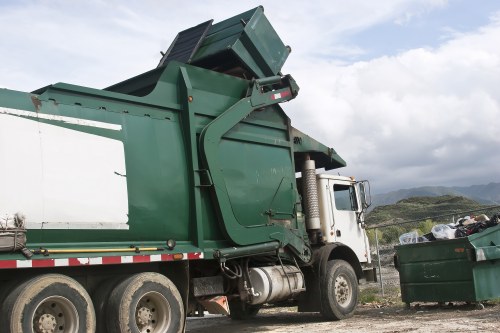Effective Construction Waste Disposal in Swiss Cottage

Construction projects in Swiss Cottage significantly contribute to the local economy and infrastructure development. However, managing the waste generated from these activities poses environmental and logistical challenges. Proper construction waste disposal is crucial to maintaining the area's aesthetic appeal and ecological balance.
Implementing effective waste disposal strategies not only ensures compliance with local regulations but also promotes sustainable building practices. This article explores the various methods and best practices for managing construction waste in Swiss Cottage.
Understanding the types of construction waste is the first step towards effective disposal. Construction waste generally includes materials like concrete, wood, metals, plastics, and hazardous substances.
Types of Construction Waste

**Concrete and Masonry**: These materials make up a significant portion of construction waste. Recycling concrete can reduce environmental impact and lower disposal costs.
Wood: Timber waste is common in construction sites. Untreated wood can often be repurposed or recycled, reducing the need for new lumber.
Metals: Metals like steel and aluminum are highly recyclable and can be reused in various construction applications.
Regulations Governing Waste Disposal

Swiss Cottage adheres to strict waste management regulations to ensure sustainable construction practices. These regulations mandate the sorting, recycling, and proper disposal of construction waste.
Compliance with these laws is essential for construction companies to avoid penalties and contribute to environmental conservation. **Understanding local regulations** helps in planning efficient waste management strategies.
**Key Regulations Include**:
- Mandatory separation of recyclable materials
- Limits on landfill disposal
- Requirements for documentation and reporting
Waste Management Strategies

Implementing a comprehensive waste management plan is vital for any construction project in Swiss Cottage. This plan should outline the processes for waste reduction, recycling, and disposal.
**Key Strategies**:
- **Waste Minimization**: Reducing waste generation through efficient planning and design.
- **Recycling and Reuse**: Identifying materials that can be recycled or repurposed.
- **Proper Disposal**: Ensuring non-recyclable waste is disposed of in compliance with regulations.
Adopting these strategies not only benefits the environment but also leads to cost savings and improved project efficiency.
Recycling Facilities in Swiss Cottage

Swiss Cottage is equipped with several recycling facilities that facilitate the proper disposal of construction waste. These facilities accept a variety of materials, ensuring that recyclable waste is processed efficiently.
**Key Recycling Centers**:
- **Swiss Recycling Hub**: Specializes in processing metals and plastics.
- **EcoBuild Recycling**: Focuses on concrete and masonry recycling.
- **GreenWood Recyclers**: Handles timber and wooden materials.
Utilizing these facilities helps construction companies in Swiss Cottage adhere to sustainable practices and reduce their environmental footprint.
Benefits of Proper Waste Disposal
Effective construction waste disposal offers numerous benefits, including environmental conservation, cost savings, and enhanced project reputation.
**Environmental Impact**:
Reducing construction waste minimizes landfill usage and lowers greenhouse gas emissions. Recycling materials conserves natural resources and reduces energy consumption.
Cost Efficiency:
Proper waste management can lead to significant cost savings by reducing disposal fees and enabling the reuse of materials. It also mitigates the risk of fines associated with non-compliance.
Reputation Enhancement:
Adopting sustainable waste disposal practices improves the reputation of construction companies, attracting environmentally conscious clients and stakeholders.
Challenges in Construction Waste Disposal
Despite the benefits, there are several challenges associated with construction waste disposal in Swiss Cottage.
**Logistical Constraints**:
Managing the transportation and storage of waste materials can be complex, especially on large construction sites.
**Cost Implications**:
Initial investments in recycling facilities and waste management systems can be high, posing financial challenges for smaller construction firms.
**Regulatory Compliance**:
Keeping up with changing regulations requires continuous effort and adaptation, which can be resource-intensive.
Innovative Solutions for Waste Management
Addressing the challenges of construction waste disposal requires innovative approaches and advanced technologies.
**Digital Waste Tracking Systems**:
Implementing digital solutions for tracking waste generation and disposal helps in monitoring compliance and optimizing waste management processes.
**Modular Construction Techniques**:
Adopting modular construction can significantly reduce waste by enabling precise material usage and easier disassembly for reuse.
**On-site Recycling Machinery**:
Using machinery that can recycle materials on-site minimizes transportation needs and accelerates the recycling process.
Case Studies in Swiss Cottage
Several construction projects in Swiss Cottage have successfully implemented effective waste disposal practices, serving as models for the industry.
**Project Alpha**:
This project achieved a waste diversion rate of 85% by integrating comprehensive recycling programs and on-site waste sorting.
**Project Beta**:
By utilizing modular construction techniques, Project Beta minimized material waste and reduced overall project costs by 20%.
**Project Gamma**:
Adopting digital waste tracking, Project Gamma enhanced regulatory compliance and optimized waste management workflows.
Best Practices for Construction Waste Disposal
To ensure effective construction waste disposal in Swiss Cottage, adhering to best practices is essential.
**Waste Segregation**:
Separating waste at the source facilitates efficient recycling and reduces contamination.
**Partnering with Recyclers**:
Collaborating with local recycling facilities ensures that waste materials are processed correctly and sustainably.
**Regular Training and Awareness**:
Educating workers about waste management practices promotes a culture of sustainability and compliance.
Future Trends in Waste Management
The landscape of construction waste disposal is continually evolving, driven by technological advancements and increasing environmental awareness.
**Circular Economy Models**:
Emphasizing the reuse and recycling of materials to create a closed-loop system reduces reliance on new resources and minimizes waste.
**Advanced Recycling Technologies**:
Emerging technologies enable more efficient and effective recycling processes, expanding the range of recyclable materials.
**Sustainable Material Innovation**:
Developing eco-friendly construction materials reduces the environmental impact and enhances waste management efforts.
Conclusion
Effective construction waste disposal is pivotal for the sustainable development of Swiss Cottage. By understanding the types of waste, adhering to regulations, implementing strategic management practices, and embracing innovative solutions, the construction industry can significantly reduce its environmental footprint.
**Take Action Today**: Partner with local waste management experts to develop a comprehensive waste disposal plan tailored to your construction project. Contact us today to learn more about sustainable waste management solutions.